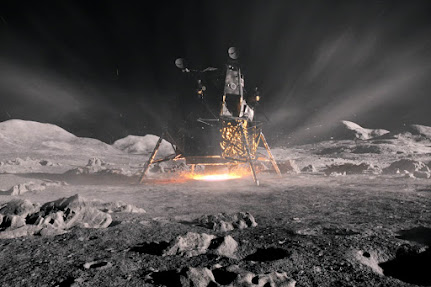For All Mankind is a counterfactual or alt-history SF story, taking as the point of divergence the premature death of Sergei Korolev in 1966. Korolev was a prime mover in the Soviet space programme and helped push the USSR into putting the first satellite and the first man in space, ahead of the Americans. His death and the resulting infighting to succeed him delayed Soviet plans for their own lunar programme. With him surviving in this alternate timeline, the USA and USSR remain locked in the space programme for many more years, trading "firsts" as they seek to outdo one another.
The idea of an alternate history is intriguing, but the show - spearheaded by Battlestar Galactica and Star Trek: The Next Generation veteran Ronald D. Moore - recognises that that is not enough by itself. The story needs to be rooted in its characters and their lives. The story pursues several story arcs across the first season to this end. In one, Edward Baldwin (Joel Kinnaman) strives to overcome his inability to keep his mouth shut and his lack of confidence in being a father to win the manned moonflight mission he craves. His friend and colleague Gordo Stevens (Michael Dorman) enjoys the rock star elements of being a hotshot test pilot and astronaut a little too much, to the despair of his wife Tracy (Sarah Jones), herself a skilled pilot. Margo Madison (Wrenn Schmidt) is trying to become a NASA flight controller, but is held back by her lack of political acumen and her close association with Saturn V designer Wernher Von Braun (Colm Feore), whose brilliance has helped America get into space but whose Nazi affiliations during WWII continue to undermine public confidence.
Subplots follow the formation of a new training programme for female astronauts, including Molly Cobb (Sonya Walger), Danielle Poole (Krys Marshall) and Ellen Wilson (Jodi Baldfour), along with Tracy Stevens. Spanning as it does the late 1960s and early 1970s, the show touches base with the civil rights movement, with Danielle serving as the first African-American trainee astronaut, and lesbian Ellen trying to keep the details of her love life a secret.
The show is exacting in its commitment to real science and technology of the period, including some very clever ideas such as repurposing Skylab into a lunar base module when the President decides they need a moonbase yesterday. The early missions, using the actual Apollo technology of the day, are recreated in impressive detail, with some intriguing variances from the norm: Apollo 11 has such a rough landing (Neil Armstrong picking a different and more difficult landing spot than he did in reality) that later missions are checked over in greater detail, leading to Apollo 13 flying without a hitch. The show's absolute high point in terms of visual effects is the landing of Apollo 15 at the edge of Shackleton Crater in the fifth episode, which is just a jaw-dropping moment.
The first half of the season spans two years and takes in a lot of plot points and ideas, making the most of its long episodes (several top an hour) to tell almost self-contained stories about training, politics and the scientific challenges of space travel, not to mention the danger. In a clever move, although actors play key real NASA figures such as Von Braun and Armstrong, all the footage of politicians use real archival footage, sometimes slightly tweaked with effects, with sound-alike actors giving an air of authenticity to proceedings. This is particularly impressive when Ted Kennedy (who in this timeline misses a certain party because of Senate hearings on the greatly expanded space programme and thus avoids the major scandal that derailed his career) becomes President, since obviously there's no archival footage of him as President to use, so the vfx crew get pretty creative in how they sell that.
The second half of the season focuses onto a period of several months and kicks off with a major catastrophe which destroys a relief mission to the moon, leaving three astronauts stranded at their base without hope of relief in the near future. They struggle to deal with being stuck in close confines with one another, with mental health problems being compounded by evidence that a rival Soviet base is up to no good. This story becomes more epic, with family crises back on Earth and a second relief mission which also runs into trouble, in an Apollo 13-on-steroids kind of way, which requires some ingenious solutions. The shift in gears sees the show come into its own, and become a triumph of modern science fiction screen storytelling.
For All Mankind's first season (****½) is a success, with some outstanding writing, acting and extremely impressive effects (the odd ropy explosion here and there excepted). The show's alternate history is sold so convincingly that it's easy to forget that this never happened, and in real life we may be lucky to get back to the moon this decade, sixty years on. But the show does feel like a vindication of science fiction. The premise is similar to Stephen Baxter's novel Voyage, whilst a lot of it feels like it draws on Arthur C. Clarke's assertion that the Vietnam War would have paid for everything he and Stanley Kubrick depicted on screen in 2001: A Space Odyssey (Vietnam still happens, but ends much earlier in the show's timeline). It's a show that feels simultaneously nostalgic but forwards-thinking, and it always compelling to watch. The show is available worldwide now on Apple+.

1 comment:
I can't trust Ron Moore after Battlestar Galactica
Post a Comment